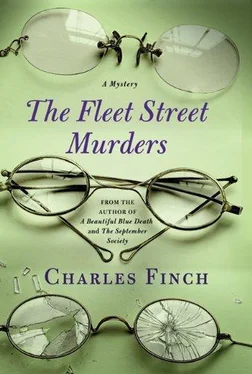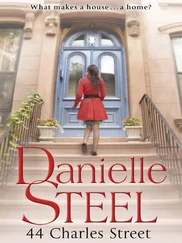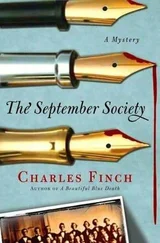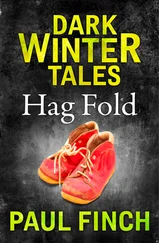Charles Finch - Fleet Street murders
Здесь есть возможность читать онлайн «Charles Finch - Fleet Street murders» весь текст электронной книги совершенно бесплатно (целиком полную версию без сокращений). В некоторых случаях можно слушать аудио, скачать через торрент в формате fb2 и присутствует краткое содержание. Жанр: Исторический детектив, на английском языке. Описание произведения, (предисловие) а так же отзывы посетителей доступны на портале библиотеки ЛибКат.
- Название:Fleet Street murders
- Автор:
- Жанр:
- Год:неизвестен
- ISBN:нет данных
- Рейтинг книги:5 / 5. Голосов: 1
-
Избранное:Добавить в избранное
- Отзывы:
-
Ваша оценка:
- 100
- 1
- 2
- 3
- 4
- 5
Fleet Street murders: краткое содержание, описание и аннотация
Предлагаем к чтению аннотацию, описание, краткое содержание или предисловие (зависит от того, что написал сам автор книги «Fleet Street murders»). Если вы не нашли необходимую информацию о книге — напишите в комментариях, мы постараемся отыскать её.
Fleet Street murders — читать онлайн бесплатно полную книгу (весь текст) целиком
Ниже представлен текст книги, разбитый по страницам. Система сохранения места последней прочитанной страницы, позволяет с удобством читать онлайн бесплатно книгу «Fleet Street murders», без необходимости каждый раз заново искать на чём Вы остановились. Поставьте закладку, и сможете в любой момент перейти на страницу, на которой закончили чтение.
Интервал:
Закладка:
“I’ve never seen him, ma’am. A gentleman. I’m afraid he’s-” Here she stopped.
“Yes?”
“Well-been drinking, mum.”
Lenox had a sinking feeling in his heart. “What’s his name?”
“He said to tell you, ‘It’s McConnell, the poor sod,’ sir. He said you’d know what that means.”
CHAPTER EIGHT
Lenox spent the next hour tucking his friend safely away in a spare room above the Queen’s Arms. McConnell, half in stupor from drink and incoherent about his reasons for coming to Stirrington, was nonetheless as clear as crystal about his reasons for being unhappy. Toto had asked him to leave. He had not only obeyed that request but had decided to absent himself from London forever. He talked wildly of returning to his native Scotland and becoming a groundskeeper at his family’s small estate or practicing medicine in the rural parts of the country. Mumbling, he fell into a troubled sleep.
Lenox spent the morning giving speeches. In his spare moments he read the previous day’s London papers. They were still full of the two “Fleet Street murders,” and amid long encomiums to Simon Pierce and Winston Carruthers (journalists, after all, love to eulogize their own; a way of pushing off their own obscurity a little further) were all the details and speculations that papers, high and low alike, could muster about Hiram Smalls, the mysterious man who had been arrested in connection with the murders.
The details were certain, if few. He lived in Bethnal Green with his mother. This picturesque detail the papers dwelt on at great length, and they inquired endlessly about Mrs. Smalls’s feelings. In person Hiram was a short, solid, muscular figure, with (purportedly) cunning eyes and without discernible scars, birth-marks, etc. He had never been in legal trouble, and while he liked the life of rough pubs and gin mills, he had never (at least that anybody would willingly say) associated with any of London’s numerous gangs or thief-taking operations.
For supper one day he had ordered out from prison to a local pub, asking for a pork chop, two large glasses of ale, and a bag of oranges. Ordering food into prison was a common enough activity- for those with money, said the papers with dark suggestion-but these oranges! Such an extravagant fruit! Local markets condescended to quote their price for a single orange to the various papers, and all agreed one could not be had for less than a shilling, the price of several meals. As was customary for prisoners, the pub extended no credit. Where, then, did Hiram Smalls get his coin-not to mention his nerve?
There were a few quotes from Inspector Exeter about the case. When the press urged him to explain how Hiram Smalls might have killed two men on opposite sides of town at once, Exeter said that the Yard wasn’t ruling out the possibility of a conspiracy between Smalls and several of his local associates. A gang, then, the press very naturally inquired? Possibly a gang, Exeter allowed, though we cannot say more. Did gangs not sometimes have rich or even aristocratic chieftains? Yes, said Exeter. However, it was evident that Smalls was either the sole mover or the leader of a conspiracy-such was clear from interrogation of the prisoner, canvassing of the eyewitnesses, and one particular piece of shocking evidence.
This piece of evidence was that Smalls and Carruthers’s maid, Martha, had unquestionably met and conversed within the last month. There were a dozen eyewitnesses who could place them at the Gun pub off of Liverpool Street, including one who happened to know both of them-Hiram from nearby Bethnal Green and Martha because the gentleman made deliveries to Winston Carruthers.
All this Lenox learned from yesterday’s papers.
Morning speeches given, he returned at two o’clock in the afternoon to find McConnell at a front table in the pub, gazing with a melancholy air through the small window he sat by. A glass of Scotch whisky sat before him, untouched. He stood up when he saw the detective.
“Lenox,” he said. “How can I apologize?”
“You’ve had a difficult week,” said Lenox.
“I had some wild idea of helping you with the campaign, being of some-of some goddamn use in this world.”
Lenox noticed McConnell’s hand trembling slightly, whether from nerves or drink. “Thomas, you must allow yourself to grieve,” he said. “You’re not at fault.”
Dismissively, the doctor responded, “Lenox, you-”
“Thomas-you’re not at fault.”
Lenox held McConnell’s gaze until the latter looked away. “At any rate,” he said.
“How is Toto’s health?” inquired Lenox in a neutral tone.
“She’s recuperating. Jane is with her.”
“How long will she require rest?”
“She can move already, but her doctor told me that she must first calm her nerves.”
“Of course.”
“It was a fluke, he also said.”
“Of course it was, Thomas. Nobody could have predicted it.”
“Well-be that as it may.”
“Nobody could have predicted it!” said Lenox, driven to a high tone. “Has it occurred to you that Toto asked you to leave because she feels responsible, she feels as if she disappointed you, Thomas? Good Christ, for an intelligent man…”
McConnell looked chastened. “Do you think so?”
“I know it’s not because she blames you.”
“Well-thank you, Charles. Excuse me for arriving in that-in that state.”
The tension in Lenox’s face relaxed slightly. “I’m pleased to have you here. Lord knows I need help.”
“I hope I can work on your behalf.”
“I’m running against a brewer. Roodle, his name is. Apparently not well liked, but the local attitude seems to run along devil-you-know lines.”
“Have you any chance?”
“Not a week ago the men who proposed I run were optimistic. Giddily optimistic, even; but Stoke’s death has lengthened my odds considerably.”
“Did you see the Times, by the way?”
“No, what?”
“They ran a small piece about you and Hilary leaving in the dead of night.”
“How funny!”
“It referred to you as-let me remember-as ‘Charles Lenox, notable for his successful intervention in the infamous murder of Bill Dabney and the disappearance of George Payson, as well as the final capture of the so-called September Society.’ In the clubs there was quite a buzz about your campaign.”
“What did people think?”
“That it was celebrity chasing by the Liberals, I’m afraid. Those who knew you emphasized your long interest in politics, but the general opinion was derisive, unfortunately.”
“I’ve dealt with worse, of course.”
Lenox saw McConnell eye the Scotch whisky. At that moment Lucy, the energetic waitress, sailed by. “Eating, Mr. Lenox?”
“I’d love something. Whatever looks good,” he said.
“Straightaway.”
“Is there much talk of Pierce and Carruthers?” asked Lenox.
“Well-you’ll understand I haven’t been lazing about Pall Mall. I only went by my club yesterday afternoon to escape the house. I do know Shreve”-this was the McConnells’ funereal and corpulent butler-“has been censoring a great deal of below-stairs gossip. I can’t imagine there’s any more tact evident in the high houses.”
Lenox laughed. “Of course not. Oh-I say, McConnell, would you mind if I was rude for a moment? I’ve been carrying this letter about with me all day looking for a moment to read it.”
McConnell acceded with a wan nod. It was the letter from Lord John Dallington, who for the space of four months or so had been filling an awkward and new role; he was Lenox’s apprentice.
It was a strange fit. Dallington was well known in London as a dissolute and disheveled, if charming, scion of the aristocracy and the eternal worry and disappointment of the Duke and Duchess of Marchmain, whose youngest son he was. The duchess was one of Lady Jane’s very closest friends, and so for years Lenox had known Dallington without ever paying him undue attention. He was a short, trim, and handsome man, whose face was unblemished by his dissipation, dark eyed and dark haired, something of a dandy; a perfect carnation always sat in his buttonhole.
Читать дальшеИнтервал:
Закладка:
Похожие книги на «Fleet Street murders»
Представляем Вашему вниманию похожие книги на «Fleet Street murders» списком для выбора. Мы отобрали схожую по названию и смыслу литературу в надежде предоставить читателям больше вариантов отыскать новые, интересные, ещё непрочитанные произведения.
Обсуждение, отзывы о книге «Fleet Street murders» и просто собственные мнения читателей. Оставьте ваши комментарии, напишите, что Вы думаете о произведении, его смысле или главных героях. Укажите что конкретно понравилось, а что нет, и почему Вы так считаете.












